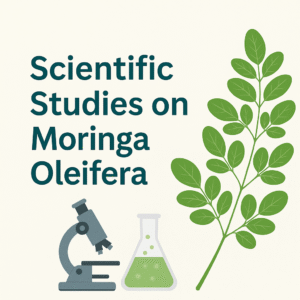Scientific Studies on Moringa Oleifera
Introduction
Known as the “Miracle Tree,” Moringa Oleifera has been used for centuries in traditional medicine across Africa, Asia, and South America. In recent years, modern science has begun to validate many of the traditional claims surrounding this powerful plant. Researchers have examined its nutritional value, antioxidant activity, and potential health benefits for the heart, liver, metabolism, and immune system. This article explores the latest scientific findings and what they mean for your health.
The Nutritional Power of Moringa
Scientific analysis shows that moringa leaves are exceptionally rich in nutrients. They contain vitamins A, C, and E; minerals such as calcium, potassium, and iron; and all nine essential amino acids. Moringa also provides plant-based protein, chlorophyll, and a wide range of bioactive compounds including flavonoids, phenolic acids, and isothiocyanates.
These compounds contribute to moringa’s reputation as one of the most nutrient-dense plants ever studied. Its leaves, seeds, pods, and roots each contain unique benefits, making the plant a valuable resource for both food and medicine.
Antioxidant and Anti-Inflammatory Effects
Numerous laboratory and animal studies demonstrate that moringa has strong antioxidant properties. Compounds like quercetin and chlorogenic acid help neutralize free radicals, reduce oxidative stress, and protect cells from damage.
Research also shows that moringa reduces markers of inflammation in tissues. Chronic inflammation is linked to diseases such as arthritis, heart disease, and diabetes. Moringa’s natural compounds can help suppress inflammatory enzymes, promoting better overall health and recovery.
Blood Sugar and Metabolic Health
One of the most researched areas of moringa science is its effect on blood sugar regulation. Studies in both animals and humans suggest that moringa may lower fasting blood glucose levels and improve insulin sensitivity.
This effect is believed to result from moringa’s ability to slow sugar absorption in the intestines, reduce oxidative stress in pancreatic cells, and enhance cellular uptake of glucose. People with pre-diabetes or type 2 diabetes may find moringa a helpful addition to a balanced diet, though it should not replace prescribed medication.
Cholesterol and Heart Health
Early research indicates that moringa may also help reduce LDL (bad) cholesterol and triglyceride levels while improving HDL (good) cholesterol. These effects can support cardiovascular health and may reduce the risk of plaque buildup in arteries.
Animal studies show that moringa extracts help maintain normal blood pressure by relaxing blood vessels and reducing lipid oxidation—two major factors in preventing heart disease.
Liver and Detoxification Benefits
The liver plays a crucial role in detoxifying the body, and studies have found that moringa can protect this vital organ. Its antioxidant enzymes, including catalase and superoxide dismutase, help reduce toxin-induced liver damage.
In addition, moringa supports the body’s natural detoxification processes by promoting the elimination of heavy metals and free radicals. This makes it an excellent supplement for people exposed to pollution, processed foods, or daily stress.
Immune System and Antimicrobial Properties
Moringa has also been shown to support immune function and fight harmful microorganisms. Its leaves and seeds demonstrate antibacterial and antifungal activity against several pathogens.
Furthermore, moringa contains compounds that can stimulate immune cells and improve the body’s natural defense mechanisms. This explains its traditional use for treating infections and improving resilience during illness.
Skin, Hair, and Anti-Aging Research

Scientific studies confirm that moringa’s rich vitamin and antioxidant profile makes it beneficial for the skin. It helps reduce oxidative damage, delay the signs of aging, and improve moisture retention.
Topical moringa oil has been shown to improve skin texture, reduce inflammation, and promote wound healing. Some cosmetic research highlights its ability to protect the skin barrier and enhance collagen production, making it a popular ingredient in beauty products.
Cancer and Cellular Protection
Preliminary research suggests that certain compounds in moringa, such as niazimicin and isothiocyanates, may inhibit the growth of cancer cells in laboratory settings. These compounds work by blocking tumor-promoting enzymes and supporting the body’s detox pathways.
While these findings are promising, scientists emphasize that moringa should not be seen as a cure for cancer but as a potential supportive food for cellular protection and health maintenance.
Human Clinical Studies
Although much of the evidence comes from animal and cell studies, several small clinical trials have been conducted. Human studies indicate modest improvements in blood sugar, cholesterol, and nutrient status when moringa supplements or leaf powders are taken regularly.
Participants often report better energy, digestion, and immune resilience. However, researchers note the need for larger, long-term studies to confirm these effects and determine the most effective doses.
Safety and Dosage Considerations
Moringa Oleifera is considered safe for most people when consumed in moderate amounts. Both the leaf powder and capsule forms are well tolerated. However, excessive intake may cause mild digestive discomfort in sensitive individuals.
Pregnant or breastfeeding women should consult a healthcare professional before using concentrated extracts, as some plant parts may have uterine-stimulating effects. Always choose high-quality, certified products free from contaminants to ensure safety and potency.
The Future of Moringa Research
Scientists continue to explore moringa’s potential across multiple health areas, including metabolic health, brain protection, and nutritional supplementation in undernourished populations.
Future research is expected to focus on standardized extracts, dosage optimization, and clinical validation of its traditional uses. As global interest grows, moringa could become one of the most studied and utilized plants in modern natural medicine.
Scientific studies on Moringa Oleifera reveal a plant with exceptional nutritional and therapeutic potential. From its antioxidant and anti-inflammatory properties to its positive effects on metabolism, heart health, and immunity, moringa offers a wide range of scientifically supported benefits.
While research continues, incorporating moringa powder or capsules into a healthy lifestyle can be a powerful step toward natural vitality and long-term wellness.


